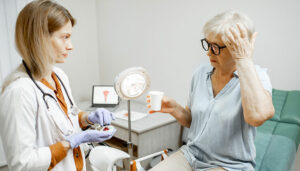Did you know women are more likely to be diagnosed with anxiety and depression than men? They are also more likely to develop Alzheimer’s disease – ⅔ of people suffering from this disease are women. Could it be that women live longer and are therefore more likely to go on to develop Alzheimers? Or is it something else?
The key thing, according to Lisa Marconi and the women’s brain institute research, is that women’s brains age differently and menopause is the key to understanding why that is.
Remember that the brain is in constant communication with the rest of the body – part of which is the reproductive system which is crucial to brain ageing due to the hormones – men have more testosterone and women more estrogen, but the main issue is that although testosterone gradually declines as men get older, estrogen takes a precipitous drop in women as they go through menopause.
 Hot flushes, night sweats, anxiety, memory lapses, insomnia, depression – all common symptoms associated with menopause – all start in the brain. How is that? The brain and ovaries are part of the neuro-endocrine system – which means there is constant communication between the brain and the ovaries. When the ovaries function starts to decline in menopause, estrogen levels drop – estrodial is a key hormone that facilitates energy production in the brain by pushing the neurons to burn glucose. So while estrogen is high, brain energy is high, when estrogen is low, the neurons slow down and age faster. Studies have shown that this leads to the plaques that are associated with Azheimers disease. Some brain regions are more affected than others.
Hot flushes, night sweats, anxiety, memory lapses, insomnia, depression – all common symptoms associated with menopause – all start in the brain. How is that? The brain and ovaries are part of the neuro-endocrine system – which means there is constant communication between the brain and the ovaries. When the ovaries function starts to decline in menopause, estrogen levels drop – estrodial is a key hormone that facilitates energy production in the brain by pushing the neurons to burn glucose. So while estrogen is high, brain energy is high, when estrogen is low, the neurons slow down and age faster. Studies have shown that this leads to the plaques that are associated with Azheimers disease. Some brain regions are more affected than others.
The hypothalamus is in charge of temperature regulation – cue hot flushes and night wears. The brain stem is in charge of your sleep pattern – cue insomnia. The amygdala – responsible for emotion – cue anxiety and depression/ mood swings. The hippocampus which is the memory center of the brain – cue forgetting your children’s names, or even how to do basic tasks.
PET scans show that the brain energy levels drop around 30% in women once they have gone through menopause – this is independent of age – which will account for so many of the symptoms women go through during menopause. This is really crazy making as your brain is going through a transition and adjustments need to be made – even if we show no cognitive difference to men, how hard it is for us to do those tasks certainly is different! Cue ‘tired all the time’!
 Certain scans also show that the amyloid plaques (associated with Alzheimers) increase with 20% during menopause. This is a risk factor rather than a definitive cause. We need to bear this is mind when women are going through menopause – whether natural or surgical which can often be years earlier. Studies show that removal of the uterus, but more so the ovaries, correlate with a higher risk of dementia in women. Although this is surely upsetting news for women – knowledge is power and there is much that can be done to offset this effect and protect our brains.
Certain scans also show that the amyloid plaques (associated with Alzheimers) increase with 20% during menopause. This is a risk factor rather than a definitive cause. We need to bear this is mind when women are going through menopause – whether natural or surgical which can often be years earlier. Studies show that removal of the uterus, but more so the ovaries, correlate with a higher risk of dementia in women. Although this is surely upsetting news for women – knowledge is power and there is much that can be done to offset this effect and protect our brains.
Should we take HRT? Although helpful for many of the symptoms of menopause, it is not currently recommended for dementia prevention, but many studies are under way in this field so hopefully we will see a change in this in years to come.
Lifestyle seems to be the best known way to help protect the brain – what foods we eat, how much sleep we get, how much exercise we get, how much stress we have in our lives all impact our hormone levels and therefore our brain health.
The best diet for hormone health seems to be the Mediterranean diet – women on this diet have a much lower risk of cognitive decline, cardiovascular disease, mood disorders, cancer and less hot flashes to boot. It is rich in foods that are rich in phytoestrogens – foods like flax seeds, sesame seeds, dried apricots, legumes, berries and melons – and don’t forget dark chocolate!
Then avoiding things like stress that can bring cortisol levels up which takes estrogen levels down as they work in balance with each other. So having a mindfulness practice or going for that walk or workout after a stressful day can be really helpful in protecting your brain and boosting your feel good hormones at the same time!
Remember, we are here to help – if you need some help in managing your menopausal symptoms, we offer individual education, acupuncture and lifestyle advice and support to get you back on track. The women’s health discovery session is aimed at looking at all of you and helping you make a plan that gets you back to thriving at life rather than just surviving!



